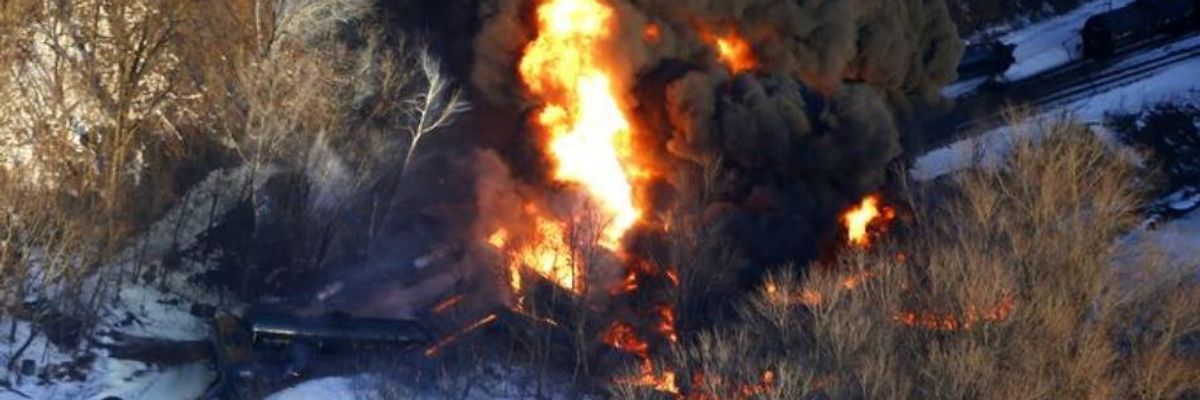Environmental groups reiterated their call for a total ban on hazardous oil trains on Friday, saying the U.S. Department of Transportation's newly released safety standards for tank cars "virtually guarantee more explosive derailments, putting people and the environment at great risk."
The final rules come two years after an unattended oil train derailed and exploded in Lac Megantic, Quebec, killing 47 people, and in the wake of a series of fiery derailments that took place in West Virginia, Illinois, and Ontario this year.
The mandates include thicker steel walls on rail cars, tougher valves, and in some cases, electronically controlled brakes.
"[T]he DOT shouldn't need a higher body count before we ban these defective cars from carrying explosive fuel through our towns and cities."
--Patti Goldman, EarthjusticeThey will also phase out over the next 10 years DOT-111 and CPC-1232 tank cars, which transport crude oil and were involved in the most disastrous derailments in recent history, including the Lac Megantic.
But a coalition of environmental organizations say the rules are not strong enough, are industry-friendly, and "leave communities at risk of catastrophe"--particularly as the DOT itself admits that derailments on main lines are likely to occur 15 times a year.
Without an immediate ban on those cars and only a few new speed limit impositions, the new rules are "yet another indication of how dangerous energy policies written by and for Big Oil are for our communities and our climate. These weak regulations allow the industry to continue endangering communities with bomb trains that facilitate hazardous expansion of the oil industry," said David Turnbull, campaigns director of Oil Change International, one of the groups in the coalition, in a press release on Friday.
"Allowing hazardous tank cars to remain in crude service for 5 more years is disgraceful," added Patti Goldman, managing attorney for environmental legal nonprofit Earthjustice, declaring: "[T]he DOT shouldn't need a higher body count before we ban these defective cars from carrying explosive fuel through our towns and cities."
The National Transportation Safety Board has made official recommendations to stop shipping crude oil in the DOT-111 and CPC-1232 tank cars, which have been found to puncture on impact. Newer tank cars, known as CPC-1232s, are not significantly safer, the board has said.
Indeed, following the West Virginia derailment in February, it was confirmed that all of the oil tank cars on the derailed train were CPC-1232 models.
"It's time for the federal government to defend and protect our communities and waterways with the same vigor they have shown in promoting the fossil fuel and transportation industries."
--Marc Yaggi, Waterkeeper Alliance
In a statement to Common Dreams at the time, Center for Biological Diversity senior scientist Mollie Matteson explained that the CPC-1232 is "little better" than its predecessor in incidents involving any speed and also "has proven to be highly vulnerable on impact." Further, its the model that ruptured in the derailment on the very same rail line in Lynchburg, Virginia in April 2014.
"Oil trains derail, spill, and explode with frightening regularity, all while passing along and over our waterways," said Marc Yaggi, executive director of Waterkeeper Alliance. "It's time for the federal government to defend and protect our communities and waterways with the same vigor they have shown in promoting the fossil fuel and transportation industries."
Their comments echo those of Sen. Maria Cantwell (D-Wash.), whose state has seen a number of protests against oil train shipments, Politicoreports.
On Friday, Cantwell criticized the new rules, which she said are "just like saying let the oil trains roll...It does nothing to address explosive volatility, very little to reduce the threat of rail car punctures, and is too slow on the removal of the most dangerous cars."
And Anthony Swift, Deputy Director of the Natural Resources Defense Council's Canada Project, added, "While it's important that the Department of Transportation is recognizing this serious and growing problem, its proposed rules do not do nearly enough to protect millions of Americans at risk of catastrophic oil train derailments."
The recent growth in oil production in Canada and the U.S. has led to a more than 4,000 percent increase in crude oil shipped by rail since 2005, the coalition points out.

